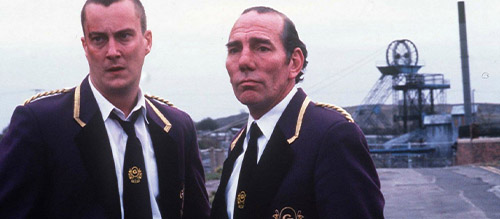Brassed Off (1996) Review
Brassed Off (1996)
Director: Mark Herman
Screenwriter: Mark Herman
Starring: Pete Postlethwaite, Ewan McGregor, Tara Fitzgerald, Stephen Tompkinson, Jim Carter, Philip Jackson, Peter Martin, Sue Johnston, Mary Healey, Melanie Hill
There are British films we consider to be status quo challenging kitchen sink dramas and others we consider to be high art explorations of often existential themes, but Mark Herman’s Brassed Off is one of those rare British releases that happens to be both; the director’s self-penned tale of a mining colliery’s brass band challenging for a national trophy as their pit is faced with closure being one of the most tightly knit, resourcefully constructed and emphatically empathetic releases of the contemporary era of British cinema – a film so good that its anti-Thatcherism message rang from the trombones of South Yorkshire to the nation at large, becoming one of the country’s most recognisable and memorable releases of the 1990s.
Starring Pete Postlethwaite who, against his agent’s wishes, signed on to star in the film during a run in Hollywood in which he would feature prominently in the likes of The Lost World: Jurassic Park (1997), and Ewan McGregor who had shot to superstardom the very same year with Trainspotting, Brassed Off’s mix of local specificity, wider cultural relevance and roaring passion was able to transform into a product of wide appeal courtesy of its cast, while screenwriter-director Mark Herman was able to right the wrong of his feature debut Blame It On the Bellboy (1992) through sheer hard-headedness regarding his vision that was, by his own testimony, often challenged by American production company Miramax.
Herman’s passion and clear vision for the film is one that is evident from very early on in Brassed Off, the story of a band challenging for a national trophy being one that could have easily slipped into the mould of a sports movie but took every opportunity to push back against that Hollywoodised structure by placing all of its focus on the true story at its heart – that of the forgotten, down-trodden, poverty-ridden miners of the North, in this case those of Yorkshire’s late 1980s.
Brassed Off works persistently to encourage comparisons between the beauty and history of the music the band plays (as well as each musician’s role within the band), and the characters’ roles at work and within society at large. As much of a staple of British culture as the mines were, and as forgotten by British government the 250,000 laid off mine-workers seemed to be, the music in Brassed Off is similarly dismissed by the characters in the film, though notably the key dichotomy here is that lives are temporary but important, while music is forever and very much a luxury – Herman’s script ensuring we’re reminded of the brutal reality of the miners’ lives (from birth to death through various character representations) as every note is played, every dialogue exchange is felt and every narrative beat passes. As such, the music (which starts very much as a reluctant service to a higher master) becomes the group’s joining force and reason to go on, their change of hearts indicative of the hope Herman has for a society to follow suit with their agenda regarding the mines and the vast number of forgotten families lost to the unemployment line, the music they come to make indicative of the bounty and the beauty that their lives could have produced.
That is to say, then, that Brassed Off is very much focused on giving the collective of people put out of work by Margaret Thatcher’s reign of terror their own voice (or, more literally, music), their undeniable contributions to the band echoing the reality of their contributions to wider society, their successes amidst great tribulation within music being representative of their more close to home and brave personal stories of surviving through gross neglect and poverty.
Morally the film is grounded in a strong, empathetic place, which screenwriter-director Mark Herman would have no doubt come to understand given his upbringing in East Yorkshire, one of the UK’s most impoverished areas. The work on the page is truly remarkable in this respect, every nook and cranny existing to further the purpose of the filmmaker’s empathetic message, and then every aspect of the filmmaking itself coming together to only further that goal, the performances, cinematography, settings and soundtrack scoring a tremendous victory for underprivileged Britons and particularly the oft-forgotten north.
While Brassed Off has perhaps become hemogenised by the out of touch perception of a select few influential cultural voices who view the film as a rip-roaring tale of skallywags, the truth of this important landmark of a British film is in fact much deeper and undeniably worthy of much more credit. Though often it may have been the case that Northern dramas have played to particular stereotypes about the culture of the area being one of destitution and stupidity, Brassed Off knows better and does everything it can to ensure that even those not in the know come to understand that too. Mark Herman’s film, from script to screen, is about as well constructed as any one British film from the past 50 years, and is a champion for the good of empathy, understanding, collective appreciation and love; a truly outstanding and remarkable piece of British cinema.
21/24


